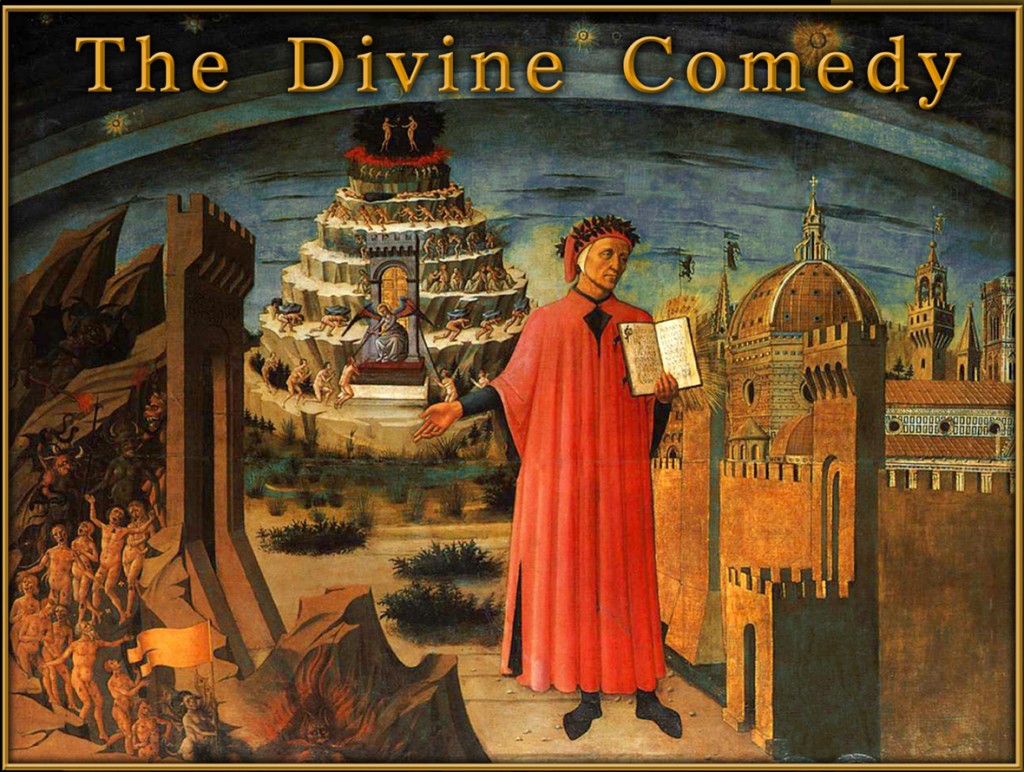
But already my desire and my will
Were being turned like a wheel, all at one speed,
By the love which moves the sun and the other stars.
Dante Alighieri
[1265 Florence-1321 Ravenna]
Dante started to write Divine Comedy at the age of 35 when he had to leave his hometown Florence due to a political dispute between the two prominent families. His journey in exile coincides with the narration of Divine Comedy which is considered as one of the timeless masterpieces of western literature. In his epic book, he recounts his afterlife journey to the other world where souls dwell in different realms depending on their virtue and merit attained during earthly life. His voyage is more than an individual quest. It represents a collective journey on becoming human, a journey that potentially encompasses all human beings.
He vividly describes the realms of Inferno (hell), Purgatory (interworld between hell and paradise), Paradiso (paradise). Every realm is divided into 9 circles, each representing a virtue or sin. Rising above and beyond Paradiso lies Empyrean (the seat of Divine Essence). The realms are an allegory for the soul’s stages of perfection in his ascending journey to the Empyrean. In the grand scheme of divine justice, each person’s soul is placed in the proper circle where he would reap what he has sown in the world.
Throughout the book, he vivifies the scenes with such genius imagery that one naturally steps in and partakes in the journey. He punctuates the striking condition of being human endowed with freewill. Using allegories and rich symbolic images, he unfolds how we contribute to our eternal destiny – be it in hell, heaven or above – with our good and bad intentions and deeds on earth.
Feelings of awe, astonishment, dread, bliss and elation… unfold as the settings change from a horrifying circle of hell to a sublime corner of contemplation, and to a farther exhilarating realm.
The journey has its dangers but Dante is under the assuring presence of the two spiritual guides whom he knows from his life on earth –Virgil and Beatrice. Virgil guides him through the gates of Hell, across Inferno and Purgatorio. Beatrice, Dante’s platonic and mystical childhood love who died at an early age, greets him outside Purgatorio. She guides him through Paradiso and on to the Empyrean – the throne of divine essence.
The journey begins at the border between the earth and the other world. Leaving the earth behind, Virgil and Dante meet Charon, the boatman, and they cross the river Acheron to approach the gates of Hell.
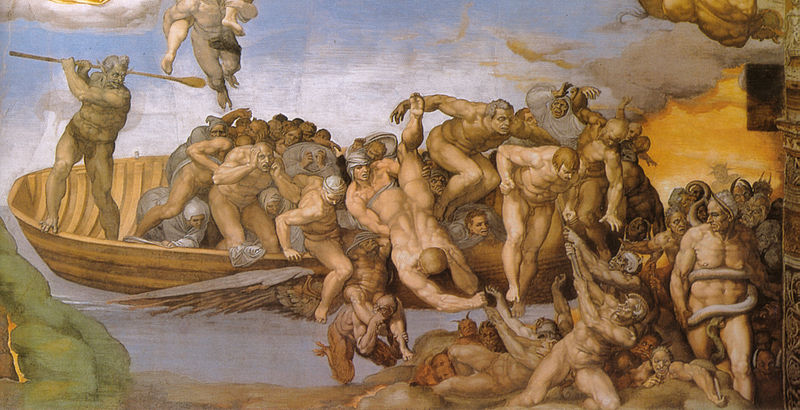
At the gates of Hell, sits the leopard, the lion, and the wolf, representing lust, pride and avarice respectively. They attempt to subjugate Dante and Virgil but Virgil masterfully outwits and eludes them.
After passing the gates of Hell, Dante and Virgil enter Inferno. Inferno is shaped like an inverted funnel comprised of 9 circles; each circle represents a different vice or weakness of human nature, and its retribution.
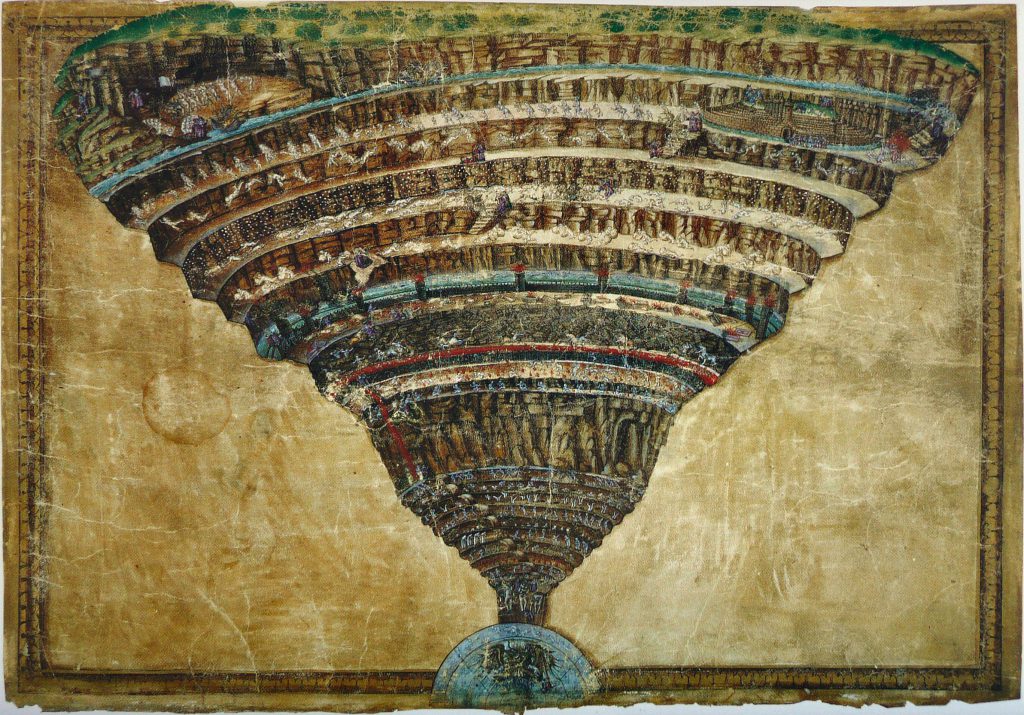
1st circle : good pagans
2nd circle : sexually promiscuous
3rd circle : the gluttons
4th circle : thieves and spendthrift wasters
5th circle : the angry ones
The gates of lower hell, the city of Dis
6th circle : heretics
7th circle : violence: the violent ones against nature, property and body; murderers, tyrants, the blasphemous, sexual perverts, the ones who commit suicide
8th circle : fraud and corruption: false prophets, hypocrites, fraudulent advisors, politicians, seducers, flatterers, swindlers, sorcerers
9th circle : treachery: traitors to family and friends, to guests, to law, to country and to God.
Center point of the earth : the evil –Lucifer (Satan), who was originally created with the highest intelligence but was expelled from heaven because of his rebellion, and pride (Purgatorio XII, 25).
The residents of Inferno are called the dead, they live in the shadows of the mistakes they have committed in life. They perpetually endure the same “ bad acts ” they have done to others on Earth, being fully aware of their situation, and yet imprisoned in their own wrongdoings. The punishments have strong physical representations which intensify the reality of the experiences, in settings such as dark forests, deep swamps, ice or rugged mountains.
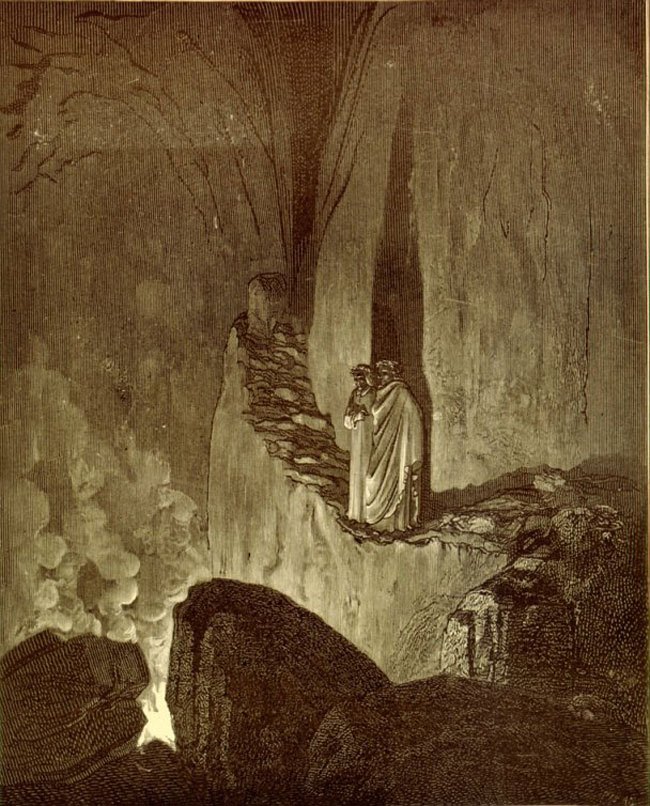
Passing through Inferno, Dante ponders on how one prepares his own hell by his misconduct in life. The journey continues to the evil’s residence located in the deepest center of the earth where a strong gravitational force pulls the human beings down.
Evil is never apart from mankind since the day God has granted human beings freewill making them susceptible to the temptations of evil (Inferno XXXIV, 110). Such was the story of Adam who was naturally disposed to the good, before he fell from Eden by eating the fruit of the Tree of the Knowledge of Good and Evil (Paradiso VII, 26).
Evil being a heartbeat away from us, one reflects on the delicacy of freewill placed in the hands of humankind.
Purgatorio is the realm of purification from the worldly weaknesses that are tainted with greed, envy, insatiable pleasure seeking, or anger. The sensations of remorse and longing envelop the spheres of Purgatorio, and the flickering hope of salvation remains.
Among the many educative scenarios of Purgatoiro, the valley of whispering thoughts is daunting because the ceaseless whispers create a chaotic and hesitant mind, confounding reason and causing one to be imprisoned in the unnerving trap of “what will I do now?” In response to the hazy bewilderment of Dante, Virgil delineates it as one of the worse situations humans fall into, for too much thought can be dangerous, and it may paralyze action. He tells Dante to move away from the whispers and follow him instead :
Why is your mind so caught up in a tangle,
My master said, that you slacken your pace?
And what does all this whispering matter to you?
Come on behind me, let those people talk;
Stand like a solid tower which does not shake
Its top whatever winds are blowing on it;
Because the man in whom thoughts bubble up
One after the other, goes wide of the mark,
Because one thought weakens the force of the another.(Purgatorio V, 10-16)
Another vibrant lesson from Purgatorio is in the allegory of humility against pride. The proud and conceited ones have to continously carry heavy rocks uphill. To bear the weight of the rocks, they have to bow, bend down and put their knees on the ground.
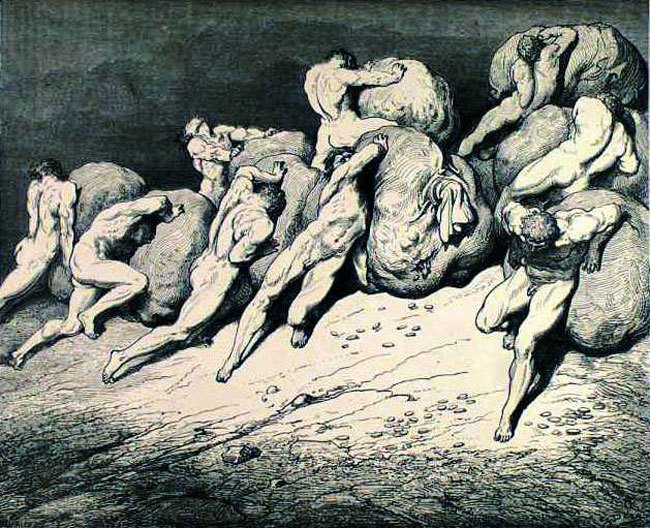
The residents of Purgatorio endure their trials borne on to them as consquences of their wrongdoings in the past. The ceaseless effort to purify themselves in the trials of Purgatorio is cultivated by the hope of gaining back the dignity of the soul.
On the summit of the Purgatorio, river Lethe is situated. It is the river of forgetfulness, the waters of which remove painful memories of past mistakes and sins, and vivify the soul. The redeemed soul who finishes his term in Purgatorio washes in this river and passes on to the appropriate circle of Paradiso.
Paradiso, ruled by justice and reason, is filled with loving benevolence. Pure faith, altruism, prudence, and courage are among the cardinal virtues which deliver the souls to Paradiso. Souls naturally have different constitutions by creation. Their potential capacities are different, but God treats them with equity, in the sense that his grace fills the individual souls in proportion to their innate capacities for love and for reason (Paradiso III, 89).
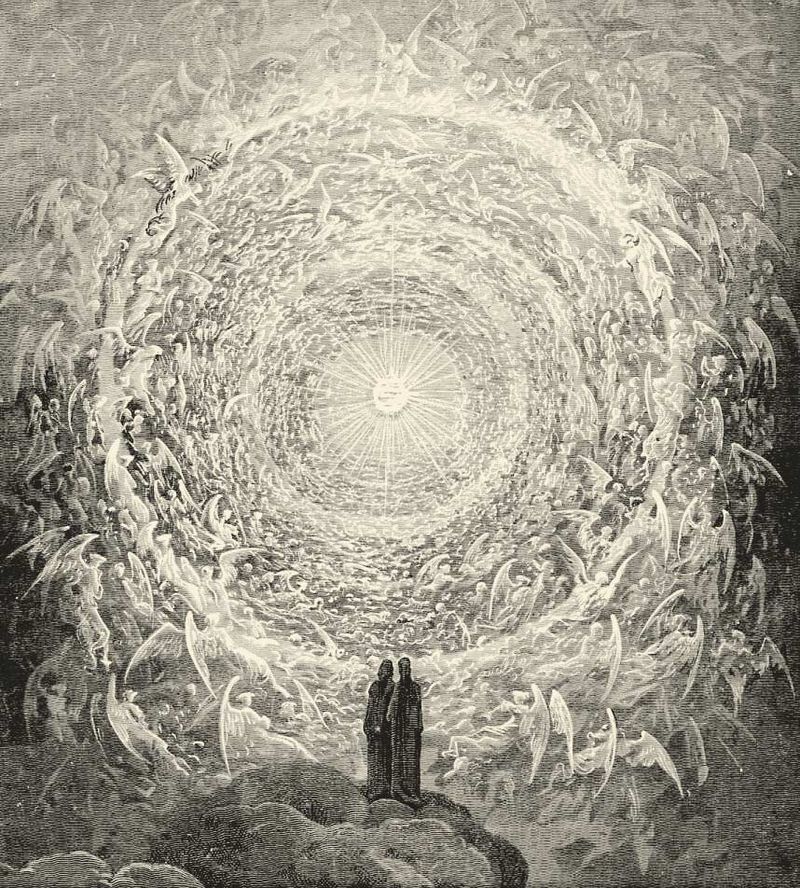
Beatrice is entrusted with the mission to guide Dante across the stages of Paradiso. It is shaped like an amphitheater made of 9 circles. Each circle is represented by a planet and the highest of them arches to the realm of infinity.
Moon –represents inconsistency: place of those who are good in heart but could not complete their vows
Mercury- represents love of fame, those who did good works but for glory and fame remain here.
Venus –planet of carnal love, for ones who are in the grip of strong material attractions
Sun –symbol of God’s illuminating grace, ultimate wisdom
Mars –courage
Jupiter – justice
Saturn – moderation and restraint
8th heaven –of faith, hope and love. Ladder of contemplation from Saturn reaches up here
9th heaven –Crystalline, the fastest sphere and the furthest of the material heavens; time, space and nature begin here
10th heaven and beyond –Empyrean, the Essence which is beyond space, time and matter
The descriptions become more abstract and symbolic as one advances in Paradiso. It is lucid, it is light and the level of happiness increases as one ascends higher up. The voyager can attain bliss, the eternal happiness of the soul, by being righteous, by practicing virtues and by purifying the soul. Obstacles in the pursuit of happiness are nothing but human faults and weaknesses.
Now you are wondering and wondering, say nothing;
But I will loosen for the hard bonds
In which your subtle thoughts are tying you up.Within the length and the breadth of this kingdom
There is no such thing as a place left for chance,
Any more than there is sadness, thirst or hunger;For whatever you see has been established
By eternal law, so that everything fits
As closely as the ring does to the finger.The king by whose power this kingdom stays
In so much love and in such delight
That no one dares to will anything beyond it,Creating all minds in the happiness
Of his own sight, endows them with grace
Differently, as He pleases; and that is enough.(Paradiso XXXII, 49-64)
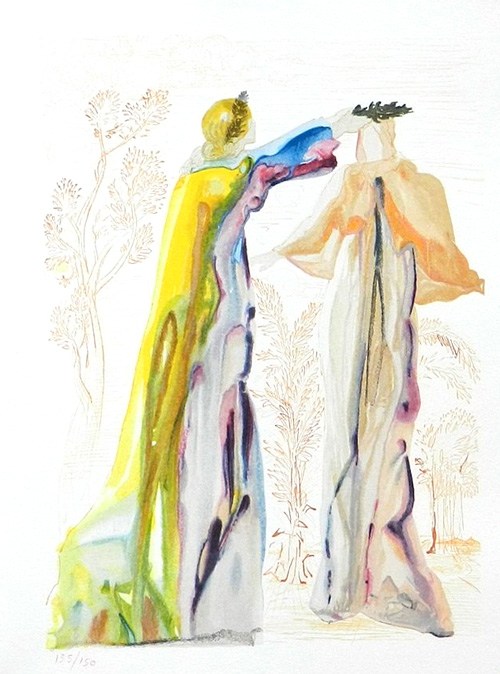
It is love that moves the cosmos, so he writes :
We are all naturally endowed with the instinct of love and that is our primal will granted us by the Creator. All created things have implanted in them an instinct or “natural love” which carries them to the pre-ordained place: for example, that in fire draws it towards the sphere of fire, and that in matter draws it down towards the central point of the earth. But man’s instinct as a rational soul is natural love or “primal will” that draws him back to the “intellectual light, full of love” of the Creator in the Empyrean (Purgatorio XVII, 91-94, Purgatorio XVIII, 49-60, Paradiso XXX, 40).
As the soul ascends towards the Empyrean, Dante’s celebrated verse echoes :
E’n la sua voluntade è nostra pace.
And in his will we find our peace.
(Paradiso III, 85)
Dante defines the blessed souls as the ones who could reach Empyrean which is the 10th and the final stage. They have the approbation to remain here in absolute felicity of being in His union with the pleroma of archangels close to Him. Empyrean is described as the ocean to which everything flows, where all is encompassed in pure light. It is here, under divine illumination, Dante witnesses the manifestation of divine essence in Beatrice.
I saw rain down upon her so much happiness
Borne by those holy intelligences
Which were created to fly at such high altitudes,That all I had seen before that
Did not keep me so suspended in wonder
Nor showed me so much of what God was like.And that love which came down to her
Singing “Ave Maria, gratia plena”
Spread his wings out before her now.
(Paradiso XXXII, 88-94)
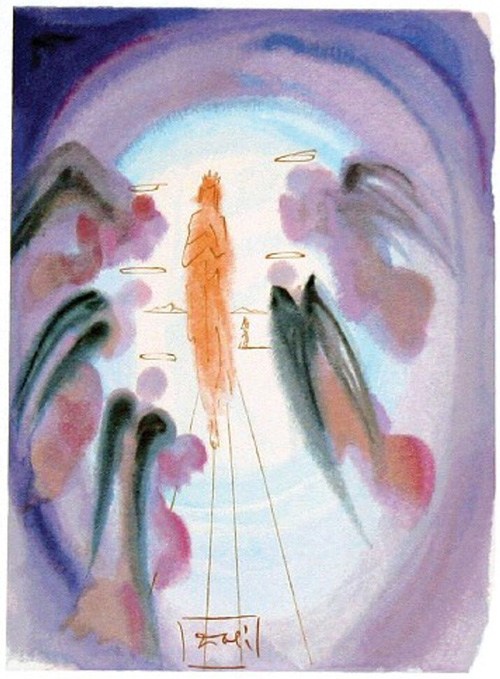
Duygu Bruce
Translated by: C.H. Sisson with an introduction and notes by D.H. Higgins, Oxford World Classics, Oxford University Press, 2008.







